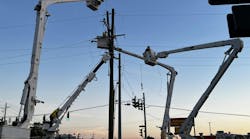A lineman’s education never ends, according to Everett Lewis, who realized the importance of safety as an apprentice after a fatality occurred in his local union. “There is always a better way of performing a task,” Lewis said. “The industry is massive and to be very successful as a Journeyman, we need to be well-rounded. The more educated, well-rounded our experience is, the greater of an asset we are to an employer. “
Everett Lewis is the Safety and Training Director for IBEW Local 1049 and the Apprentice Coordinator for Northeastern Joint Apprenticeship (NEAT) for Long Island, New York. NEAT prepares apprentices for exciting, challenging and rewarding careers as outside journeyman linemen, while providing union journeymen with continuing education. NEAT operates nine modern training centers throughout the northeast corridor of the United States, with headquarters in Douglassville, Pennsylvania. NEAT training facilities feature on-site classrooms and laboratories, and outdoor pole-climbing yards.
As a safety advocate, Everett Lewis spends as much time as possible out on the job sites with the crews. He assists the crews with questions on work methods and compliance with utility safety rules. He also assists the contractors by providing a way for the Union to take a proactive approach to safety.
“I found the crews to be very accepting of the assistance and presence on the job sites,” Lewis said. He coordinates all the apprentice training, testing, and conducts the Journeyman training for overhead, underground, and substation work. He maintains and updates the mandatory yearly qualifications such as CPR, first aid, pole-top, manhole and bucket rescue. He qualifies members in OSHA 10/30, Confined Space, Cable Splicing, Crane, and CDL upgrades. He also provides ongoing education classes such as personal protective grounding and transformer connections and theory.
“The ongoing training with journeymen is quite vital now. Customer expectations are much more demanding the past few years and will continue to become more demanding,” Everett said. “ The utility's zero tolerance for accidents, incidents, and mandating complete transparency has placed a strong responsibility on contractors. There is a direct relationship with training and incident rates. The more a group is engaged with training, the lower the incident rate. Developing and maintaining a culture that embraces this concept is the key to providing a workforce that can be very successful in this industry.”
Everett Lewis started his career as a line clearance tree trimmer in 1986. He became an apprentice lineman in 1990 and graduated from Northeastern Joint Apprenticeship in 1995. Toward the end of his apprenticeship, he started his education in occupational safety. In 1997, he became an apprentice instructor for NEAT. He received a Masters in Occupational Safety in 2004. In 2004-2005 he was an Assistant Director for Northeastern Joint Apprenticeship where the majority of his time was spent on curriculum development. From 2006 to 2010, he was the lead apprentice and safety instructor for Local 1049 IBEW. Then in 2010, he became the Safety and Training Director for Local 1049 IBEW.
When he was an apprentice, he noticed that a skilled lineman could make the job look exceptionally easier. “After I completed my apprenticeship, I started instructing for NorthEastern Joint Apprenticeship and enjoyed helping the apprentices. As I became more involved in training, I felt a greater responsibility to become more educated. I believe that Instructors have to be able to live up to what they expect from their students,” Lewis said.
He also believes that linemen should keep an open mind toward learning. “An apprentice will be open minded, absorb what is around them, and build confidence as they become more educated. If that apprentice keeps that same mindset throughout their entire career, they will be exceptionally talented,” he said.
Lewis’ past experience has given him the ability to be comfortable interacting with members. “My position enables me to work directly with the employers to schedule training classes. We work together to schedule groups keeping certifications current,” he said. “If there is an incident; I play a role in the investigation, analysis, and can provide post-accident training. Spending so much time in the field with the crews allow me to see first-hand any improvements that need to be made.”
He said the most challenging aspect of this position is making the best out of a limited amount of time. “Linemen have busy lives, and contractors have busy schedules. I am currently creating a new transformer school that will be much more practical for apprentices or a refresher-type training for experienced linemen.”
But there is a pay-off for all the extra hours and commitment: “Noticing a difference in the mindset of members I serve. If I offer an optional training program, and the majority of the members enlist. This is where I enjoy the job the most, because the reward is people who view training as a positive and enjoyable. When workers dedicate their own time to better themselves, it is a good work culture.”
Lewis has always been up for challenges, though, and it crosses over into his spare time. He is an avid crossfitter. “I love how physically and mentally challenging it can be (not unlike line work). It is a complete escape for an hour of the day, however, there are fundamental aspects of it that improve every aspect of my life.”

